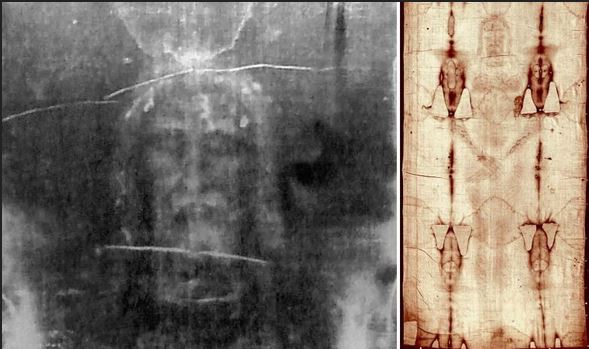







~E
Brothers and sisters:
You were once darkness,
but now you are light in the Lord.
Live as children of light,
for light produces every kind of goodness
and righteousness and truth.
Try to learn what is pleasing to the Lord.
Take no part in the fruitless works of darkness;
rather expose them, for it is shameful even to mention
the things done by them in secret;
but everything exposed by the light becomes visible,
for everything that becomes visible is light.
Therefore, it says:
“Awake, O sleeper,
and arise from the dead,
and Christ will give you light.”

Today’s reading reminds me of a feature in many near-death experiences (NDEs), which is that often, the experience begins with the individual seeing a bright (but not blinding) light. Sometimes, the individual encounters what is described as a “being of light” of great love.
In contrast are the few reports of unpleasant near-death experiences (few because, I suspect, those with such experiences are ashamed to report them), notably that of Bill Clinton who underwent a quadruple bypass cardiac surgery in September 2004. In an interview on ABC’s “Primetime Live,” he said that during his heart operation, “I saw, like, dark masks crushing, like, death masks being crushed, in series, and then I’d see these great circles of light and then, like, Hillary’s picture or Chelsea’s face would appear on the light, and then they’d fly off into the dark.” (Free Republic)
For everyone who does wicked things hates the light
and does not come toward the light,
so that his works might not be exposed.
But whoever lives the truth comes to the light,
so that his works may be clearly seen as done in God.
May the peace and light of Jesus Christ, Our Lord be with you,
~E
Filled with the Holy Spirit, Jesus returned from the Jordan
and was led by the Spirit into the desert for forty days,
to be tempted by the devil.
He ate nothing during those days,
and when they were over he was hungry.
The devil said to him,
“If you are the Son of God,
command this stone to become bread.”
Jesus answered him,
“It is written, One does not live on bread alone.”
Then he took him up and showed him
all the kingdoms of the world in a single instant.
The devil said to him,
“I shall give to you all this power and glory;
for it has been handed over to me,
and I may give it to whomever I wish.
All this will be yours, if you worship me.”
Jesus said to him in reply,
“It is written
You shall worship the Lord, your God,
and him alone shall you serve.”
Then he led him to Jerusalem,
made him stand on the parapet of the temple, and said to him,
“If you are the Son of God,
throw yourself down from here, for it is written:
He will command his angels concerning you, to guard you,
and:
With their hands they will support you,
lest you dash your foot against a stone.”
Jesus said to him in reply,
“It also says,
You shall not put the Lord, your God, to the test.”
When the devil had finished every temptation,
he departed from him for a time.

The account in Luke 4 of the temptation of Jesus in the desert is nothing short of fascinating.
What the account tells us is that:

May the peace of Jesus Christ, Our Lord be with you.
-E
Brothers and sisters:
When this which is corruptible clothes itself with incorruptibility
and this which is mortal clothes itself with immortality,
then the word that is written shall come about:
Death is swallowed up in victory.
Where, O death, is your victory?
Where, O death, is your sting?

Near-death experiences (NDEs) — events that take place as a person is dying or, in some cases, is already clinically dead — are compelling evidence that there is life after death.
People who have NDEs are called near-death experiencers (NDErs). Medical doctors and other researchers have examined this phenomenon in depth. An excellent book is Evidence of the Afterlife, by Jeffrey Long, M.D. (with Paul Perry).
Among the near-death experiences is the phenomenon of life review, when the life of the dying person flashes before him/her, sometimes as a three-dimensional, panoramic review of everything significant that had happened in the NDEr’s life. From Evidence of the Afterlife, p. 110:
[The NDErs] view themselves from a third-person perspective. They watch themselves interacting with the people in their lives. They see how they treated others and often step into the other person’s place so they know how that person felt when interacting with them….
A spiritual being sometimes accompanies the person who is having the life review. This being may serve as a kind of loving guide…discussing the spiritual ramifications of the events of the NDEr’s life…help[ing] the NDEr put his or her life into perspective….
[L]ife reviews are often one of the most transformative elements of the NDE.
Now, we have scientific evidence of NDE life review.
Joe Pinkstone reports for The Telegraph, Feb. 23, 2022:
Our life may very well flash before our eyes when we are on the brink of death, according to the first recording of a dying brain.
The discovery was made when a patient died while having their brain activity monitored by experts. Electrodes detected an uptick in activity linked to memory recall and dreaming.
Experts believe this backs up reports and accounts from people who have suffered near-death experiences and claim to have seen their life flash before their eyes.
This is the first empirical data from an actual death to support the theory….
The individual who died was an 87-year-old man from Estonia who had been admitted to hospital after a fall.
He was sent for various scans that found a significant brain bleed and an operation was successful. Afterwards, the patient was stable for two days in intensive care.
But he then began to suffer from epileptic seizures, undergoing at least a dozen episodes, so the clinicians organised an EEG — electroencephalography — to help track and treat the haywire brain activity caused by the trauma.
While the EEG was still ongoing, the patient suffered a cardiac arrest and died, with the data being the first and only time the activity of a dying human brain has been recorded.
This gave the doctors and their colleagues a unique opportunity to study what happens in the brain as a person passes over the threshold from life to death.
They saw that at the time of death, brain activity was very similar to what happens when a person is meditating, dreaming, or reliving past memories….
While all brain waves began to dwindle, gamma accounted for a larger than normal percentage. Previous studies have found gamma waves to be responsible for some high-functioning processes and are intrinsically linked to concentrating, dreaming, memory retrieval and conscious perception.
Dr. Ajmal Zemmar, a neurosurgeon at the University of Louisville, who had studied this case, told Frontiers Science News: “Through generating oscillations involved in memory retrieval, the brain may be playing a last recall of important life events just before we die, similar to the ones reported in near-death experiences.”
~E
The Bible is not solely a religious opus. It also contains many words of wisdom — of sagacity, discernment, and insight.
Below are some examples from today’s readings.
When a sieve is shaken, the husks appear;
so do one’s faults when one speaks.
As the test of what the potter molds is in the furnace,
so in tribulation is the test of the just.
The fruit of a tree shows the care it has had;
so too does one’s speech disclose the bent of one’s mind.
Praise no one before he speaks,
for it is then that people are tested.
Jesus told his disciples a parable,
“Can a blind person guide a blind person?
Will not both fall into a pit?….
Why do you notice the splinter in your brother’s eye,
but do not perceive the wooden beam in your own?
How can you say to your brother,
‘Brother, let me remove that splinter in your eye,’
when you do not even notice the wooden beam in your own eye?
You hypocrite! Remove the wooden beam from your eye first;
then you will see clearly
to remove the splinter in your brother’s eye.
“A good tree does not bear rotten fruit,
nor does a rotten tree bear good fruit.
For every tree is known by its own fruit.
For people do not pick figs from thornbushes,
nor do they gather grapes from brambles.
A good person out of the store of goodness in his heart produces good,
but an evil person out of a store of evil produces evil;
for from the fullness of the heart the mouth speaks.”

Here are some more words of wisdom from the Bible:
“The beginning of wisdom is this: Get wisdom. Though it cost all you have, get understanding.” -Proverbs 4:7
“When pride comes, then comes disgrace, but with humility comes wisdom.” Proverbs 11:2
“Reckless words pierce like a sword, but the tongue of the wise brings healing.” Proverbs 12:18
“Where there is strife, there is pride, but wisdom is found in those who take advice.” Proverbs 13:10
“Listen to advice and accept discipline, and at the end you will be counted among the wise.” -Proverbs 19:20
“A fool gives full vent to his anger, but a wise man keeps himself under control.” Proverbs 29:11
“Behold, the fear of the Lord, that is wisdom, and to depart from evil is understanding.” Job 28:28
“Be very careful, then, how you live—not as unwise but as wise, making the most of every opportunity, because the days are evil.” Ephesians 5:15-16
“But the wisdom that comes from heaven is first of all pure; then peace-loving, considerate, submissive, full of mercy and good fruit, impartial and sincere.” James 3:17
“…Christ, in whom are hidden all the treasures of wisdom and knowledge.” Colossians 2:2-3
“The heart of the wise inclines to the right, but the heart of the fool to the left.” Ecclesiastes 10:2
And lastly:
“If any of you lacks wisdom, you should ask God, who gives generously to all without finding fault, and it will be given to you.” -James 1:5
May the peace and love of Jesus Christ, Our Lord, be with you!
~E
In Matthew 22:36-39, a Pharisee asked Jesus, “Master, which is the greatest commandment of the Law?”
Jesus said to him, “You must love the Lord your God with all your heart, with all your soul, and with all your mind. This is the greatest and the first commandment. The second resembles it: You must love your neighbor as yourself.“
19 years ago, after a journey that took some 10 years, I returned to Him. Since my coming home, I can honestly say I have loved the Lord, my God, with my whole heart, my whole soul, my whole mind, and with all my strength.
But, knowing the darkness of the human heart and all the foibles of fallen humanity — foibles of which I amply partake — I have not been able to “love my neighbor as myself.” Knowing my own wretchedness, I don’t even love myself with my whole heart, my whole soul, and my whole mind!
To love my neighbor as myself is difficult enough. But Jesus tells us we must do even more:
Jesus said to his disciples:
“To you who hear I say,
love your enemies, do good to those who hate you,
bless those who curse you, pray for those who mistreat you.
To the person who strikes you on one cheek,
offer the other one as well,
and from the person who takes your cloak,
do not withhold even your tunic.
Give to everyone who asks of you,
and from the one who takes what is yours do not demand it back.
Do to others as you would have them do to you.
For if you love those who love you,
what credit is that to you?
Even sinners love those who love them.
And if you do good to those who do good to you,
what credit is that to you?
Even sinners do the same.
If you lend money to those from whom you expect repayment,
what credit is that to you?
Even sinners lend to sinners,
and get back the same amount.
But rather, love your enemies and do good to them,
and lend expecting nothing back;
then your reward will be great
and you will be children of the Most High,
for he himself is kind to the ungrateful and the wicked.
Be merciful, just as your Father is merciful….
For the measure with which you measure
will in return be measured out to you.”

We are left with these questions:
Alas, most priests, if not all of the priests whom I’ve heard, don’t define or explain those terms, which is puzzling because the answers are given, of course, by Christ Himself.
In Luke 10:29-37, in response to the question “who is my neighbor”, our Lord replied with the parable of the good Samaritan:
“A man fell victim to robbers as he went down to Jerusalem from Jericho. They stripped and beat him and went off leaving him half-dead. A priest happened to be going down that road, but when he saw him, he passed by on the opposite side. Likewise, a Levite came to the place, and when he saw him, he passed by on the opposite side. But a Samaritan traveler who came upon him was moved with compassion at the sight. He approached the victim, poured oil and wine over his wounds and bandaged them. Then he lifted him up on his own animal, took him to an inn, and cared for him. The next day he took out two silver coins and gave them to the innkeeper with the instruction, ‘Take care of him. If you spend more than what I have given you, I shall repay you on my way back.’ Which of these three, in your opinion, was neighbor to the robbers’ victim?” He answered, “The one who treated him with mercy.” Jesus said to him, “Go and do likewise.”
Note that Jesus did not identify the robbers as our “neighbors”. Our “neighbor” is the man who “fell victim to robbers” who himself had done no wrong.
In Leviticus 19:17-18, it is said:
“You shall not bear hatred for your brother or sister in your heart.
Though you may have to reprove your fellow citizen,
do not incur sin because of him.
Take no revenge and cherish no grudge against any of your people.
You shall love your neighbor as yourself.”
And so, Luke 10 and Leviticus 19 give us the definitions we need:
Recognizing the above definitions, to “love” our “neighbors” and our “enemies” does not mean we forego justice and what is right. But we are asked to refrain from investing emotions in them — emotions of hatred, grudge-bearing, and the desire for revenge. More than that, we are asked to be merciful and pray for them.
That being said, for many of us, loving our “neighbors” and even our “enemies” is still a task that is neither simple nor easy. When we falter, just remember this:

Offered in humility and love,
~E
Brothers and sisters:
If Christ is preached as raised from the dead,
how can some among you say there is no resurrection of the dead?
If the dead are not raised, neither has Christ been raised,
and if Christ has not been raised, your faith is vain;
you are still in your sins.
Then those who have fallen asleep in Christ have perished.
If for this life only we have hoped in Christ,
we are the most pitiable people of all.
But now Christ has been raised from the dead,
the firstfruits of those who have fallen asleep.

Today’s reading from St. Paul’s letter to the Corinthians is a harbinger of Easter Sunday, which will be on April 17, a little more than two months away.
In his letter, St. Paul was blunt and forthright in identifying the Resurrection of Jesus of Nazareth from the dead as central to the Christian faith. He said, “if Christ has not been raised, your faith is vain“, i.e., worthless or futile.
Happily, we do have empirical evidence of the Resurrection, one of which is the Church of the Holy Sepulchre in the Christian Quarter of the Old City of Jerusalem — the site where Jesus was crucified (“Calvary” or “Golgotha”), and the site of the tomb where Jesus’ body was placed. The tomb is enclosed by an 18th-century shrine called the Edicule.
In 1809, during a partial opening of the Edicule by the architect Nikolaos Komnenos, a “sweet aroma” emanated from the tomb, the same “scent of sanctity” that often accompanies Marian apparitions and the tombs of some saints.
More recently, on October 26-28, 2016, scientists undertaking restoration work in the Edicule also smelled a “sweet aroma” when they removed the marble slab that covers the tomb. There were also electromagnetic disturbances: some of the measuring instruments used by the scientists, when placed vertically on the stone on which Christ’s body rested, either malfunctioned or ceased to work entirely. (Source: Aleteia)
According to scientists at Italy’s National Agency for New Technologies, Energy and Sustainable Economic Development (ENEA) who, in 2011, concluded their five-year study of the Shroud of Turin — the linen cloth in which Jesus’ body was wrapped — the image on the Shroud had been left by “a short and intense burst of VUV directional radiation,” stronger than could be created by any technology currently available to man. VUV is vacuum ultra-violet, a type of electromagnetic radiation.

Shroud of Turin
Imagine how powerful the radiation burst of the Resurrection must have been to leave electromagnetic traces after more than 2,000 years, which were detected by those scientists restoring the Edicule in 2016.
And if the Resurrection is true, then we and our loved ones will also be resurrected after our mortal bodies died, just as Jesus had raised from the dead Lazarus, the daughter of Jairus, and the son of the widow at Nain.
Brothers and sisters:
If then you were raised with Christ, seek what is above,
where Christ is seated at the right hand of God.
Think of what is above, not of what is on earth.
For you have died, and your life is hidden with Christ in God.
When Christ your life appears,
then you too will appear with him in glory.
Keep the faith!
May the peace and love of Jesus Christ Our Lord be with you,
~E
I am reminding you, brothers and sisters,
of the gospel I preached to you,
which you indeed received and in which you also stand.
Through it you are also being saved,
if you hold fast to the word I preached to you,
unless you believed in vain.
For I handed on to you as of first importance what I also received:
that Christ died for our sins
in accordance with the Scriptures;
that he was buried;
that he was raised on the third day
in accordance with the Scriptures;
that he appeared to Cephas, then to the Twelve.
After that, Christ appeared to more
than five hundred brothers at once,
most of whom are still living,
though some have fallen asleep.
After that he appeared to James,
then to all the apostles.
Last of all, as to one born abnormally,
he appeared to me.
For I am the least of the apostles,
not fit to be called an apostle,
because I persecuted the church of God.
But by the grace of God I am what I am,
and his grace to me has not been ineffective.
Indeed, I have toiled harder than all of them;
not I, however, but the grace of God that is with me.
Therefore, whether it be I or they,
so we preach and so you believed.

Two Sundays ago, in my post, “Sunday Devotional: Faith, Evidence and Logic,” I made the case for Christian belief not based exclusively on faith, but also on empirical evidence and logical reasoning.
The empirical evidence for Christianity includes the testimonies of percipient witnesses, which are critical to the determination of truth in law. A “percipient witness” is defined by Nolo’s Plain-English Law Dictionary as “A witness who testifies about things she or he actually perceived. For example, an eyewitness.”
Today’s second reading from St. Paul’s letter to the Corinthians is yet another example of percipient witnesses — eyewitnesses of the resurrected Jesus of Nazareth who, on one occasion, numbered more than 500 people.
Those percipient witnesses told others (“so we preach”) about the resurrected Christ whom they had seen with their very eyes and heard with their very ears. Their first-person testimonies were so powerful that others were convinced of their veracity (“so you believed”).
To quote New Testament Professor Emeritus Mark Allan Powell in his book, Jesus As a Figure in History, p. 9 (bold emphasis supplied):
[F]or me…the Jesus of this story has come to mean…recognizing the story to be grounded in the witness of the Spirit, in the testimonies of saints and martyrs, and in my own life experience…. I think of the story…not as the place where I look for Jesus but as the place where he finds me.
May the love and peace of Our Lord Jesus Christ be with you,
~E
Jesus said to his disciples:
“As the Father loves me,
so I also love you.
Remain in my love.
If you keep my commandments,
you will remain in my love….
This is my commandment:
love one another as I love you.
No one has greater love than this,
to lay down one’s life for one’s friends.
You are my friends if you do what I command you.”

“This is my commandment: love one another as I love you.”
So what exactly is love?
In our corrupt times, the word “love” is used to justify any or all deeds, even the most perverse and evil.
Carnal lust is called “love”. Pedophilia is called “man-boy love”. Bestiality is re-named “zoophilia” — love of animals. Incest is given the gloss by faux science as “genetic sexual attraction”.
“Love” has become a synonym of “Do as you will”.
This is what love really means.
Brothers and sisters:
Strive eagerly for the greatest spiritual gifts.
But I shall show you a still more excellent way.
If I speak in human and angelic tongues,
but do not have love,
I am a resounding gong or a clashing cymbal.
And if I have the gift of prophecy,
and comprehend all mysteries and all knowledge;
if I have all faith so as to move mountains,
but do not have love, I am nothing.
If I give away everything I own,
and if I hand my body over so that I may boast,
but do not have love, I gain nothing.
Love is patient, love is kind.
It is not jealous, it is not pompous,
It is not inflated, it is not rude,
it does not seek its own interests,
it is not quick-tempered, it does not brood over injury,
it does not rejoice over wrongdoing
but rejoices with the truth.
It bears all things, believes all things,
hopes all things, endures all things.
Love never fails.
If there are prophecies, they will be brought to nothing;
if tongues, they will cease;
if knowledge, it will be brought to nothing.
For we know partially and we prophesy partially,
but when the perfect comes, the partial will pass away.
When I was a child, I used to talk as a child,
think as a child, reason as a child;
when I became a man, I put aside childish things.
At present we see indistinctly, as in a mirror,
but then face to face.
At present I know partially;
then I shall know fully, as I am fully known.
So faith, hope, love remain, these three;
but the greatest of these is love.

by Jon McNaughton
If we are honest with ourselves, we would admit that we say we love another but often are not patient or kind to the other, or are jealous or pompous or inflated or rude or quick to anger or brood over some injury instead of being forgiving. How many of us say we love but are instead selfish, self-seeking and self-advancing?
I know I fail St. Paul’s definition of love woefully often.
Granted, we are a fallen creation and are sinful by nature. But if we claim to love Jesus, He told us in no uncertain terms that for us to remain in His love, we must keep His commandments, especially the commandment to “love one another”.
So, if we don’t at least try, and try, and try to love in accordance to the true definition of love, then we are in jeopardy of not remaining in God’s love.
What a terrifying thought!
I don’t want that. Do you?
May the love and peace of our Lord Jesus Christ be with you,
~E
Since many have undertaken to compile a narrative of the events
that have been fulfilled among us,
just as those who were eyewitnesses from the beginning
and ministers of the word have handed them down to us,
I too have decided,
after investigating everything accurately anew,
to write it down in an orderly sequence for you,
most excellent Theophilus,
so that you may realize the certainty of the teachings
you have received.
Jesus returned to Galilee in the power of the Spirit,
and news of him spread throughout the whole region.
He taught in their synagogues and was praised by all.
He came to Nazareth, where he had grown up,
and went according to his custom
into the synagogue on the sabbath day.
He stood up to read and was handed a scroll of the prophet Isaiah.
He unrolled the scroll and found the passage where it was written:
The Spirit of the Lord is upon me,
becaus
to bring glad tidings to the poor.
He has sent me to proclaim liberty to captives
and recovery of sight to the blind,
to let the oppressed go free,
and to proclaim a year acceptable to the Lord.
Rolling up the scroll, he handed it back to the attendant and sat down,
and the eyes of all in the synagogue looked intently at him.
He said to them,
“Today this Scripture passage is fulfilled in your hearing.”

It is often said that belief in God and Christianity is a matter of faith, which the dictionary defines as “belief that is not based on proof”. By “proof” is meant not the proof of mathematics, but the “proof” of empirical evidence. And so, it is said that, with the grace from God, the believer takes a “leap of faith” across a cavern of lack of empirical evidence, to believe and trust in something intangible that’s incapable of being proved.
Though the existence of God and the assertion that God became man in the person of Jesus Christ cannot be 100-percent proven with empirical evidence –bearing in mind that there are no absolute, 100%-true knowledge in the empirical domain because we have not seen everything in the Universe — that does not mean an absence of evidence. There is also the matter of logic — the employment of reasoning, inference and sound judgment to ascertain truth or falsity.
Today’s Gospel reading from Luke 1 and 4 includes both empirical evidence and logic:
(1) The empirical evidence consists of three pieces:
(2) Logic:
The account in Luke 4 continues that after reading the passage from the prophet Isaiah, Jesus said to “all in the synagogue” who were looking “intently at him”:
“Today this scripture passage is fulfilled in your hearing.”
C. S. Lewis, in a series of BBC radio talks later published as the book Mere Christianity (pp. 54-56), perfectly describes the choices available to us when confronted with Jesus’ startling assertion. Lewis said:
“A man who was merely a man and said the sort of things Jesus said…would either be a lunatic — on the level with the man who says he is a poached egg — or else he would be the Devil of Hell. You must make your choice. Either this man was, and is, the Son of God, or else a madman or something worse. You can shut him up for a fool, you can spit at him and kill him as a demon or you can fall at his feet and call him Lord and God, but let us not come with any patronizing nonsense about his being a great human teacher. He has not left that open to us. He did not intend to…. Now it seems to me obvious that He was neither a lunatic nor a fiend: and consequently, however strange or terrifying or unlikely it may seem, I have to accept the view that He was and is God.”
In stark terms, those are our choices. Jesus of Nazareth — whose life, words and deeds, including many miracles, were testified to by countless percipient eyewitnesses — was either (1) insane; (2) a pathological liar or evil; or (3) who he said he was — God.
With the available empirical evidence and employing our intellect and logical faculties, we should ask ourselves:
So, the next time someone sneers at your belief in Jesus being the Son of God, calling your belief a blind and irrational “leap of faith,” you can with confidence declare that your faith has the support of both (empirical) proof and logic. The atheist, however, is woefully deficient in both — a subject for a future discussion.
May the peace and love of Jesus Christ, our Lord, be with you,
~E